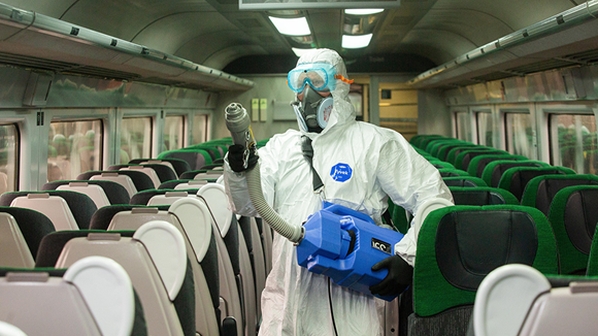The special treatment is sprayed inside train vestibules overnight, creating a fog which coats all surfaces and is proven to fight against Covid-19 for up to 28 days. The trial comes in the midst of the further easing of lockdown restrictions in England, and the introduction of mandatory face coverings on public transport from June 15.
The trial follows an update to the National Rail app, which indicates to people searching for a journey if a specific train or station is set to be busy. The app will display operational messages about busy trains and stations in passenger-friendly language on journey planning websites and apps.
Users will see a red or yellow warning triangle when they search their journey, and by clicking on it, will be able to find out more information and advice.
Finland: A survey conducted with 3447 VR passengers found cleaning was one of their highest priorities, along with the distance between passengers.
The greatest concern was the cleanliness of the toilets (52%), followed by support surfaces (35%) and the door release buttons (33%). Nearly half of respondents (47%) wanted surfaces to be disinfected, with 42% wanting certainty about the possibility of hand washing, 41% more cleaning on trains and 36% more availability of gloves.
VR says it has introduced 10 measures in response to the survey, including increasing the cleaning of our trains and customer premises, switching to disinfectant cleaners, purchasing a special disinfection device for more thorough cleaning, and adding moving cleaning patrols to services.
Argentina: Argentine Trains has launched a “Reserve your train” mobile application, allowing essential workers who have a certificate to travel to purchase a ticket. Passengers can also order their tickets by phone or online.
The government has introduced a requirement for all passengers to book their travel, in order to reduce crowding and allow essential workers to travel safely while maintaining social distancing.
Switzerland: Swiss Federal Railways (SBB) says delays in construction work and driver training will have a small effect on the introduction of the 2021 timetable.
The opening of the Ceneri Base Tunnel will allow more freight services to operate, and SBB also plans to expand its passenger offer, including international services.
However, the operator says there will be isolated delays in the role out of the timetable, with the details of these still to be worked out. All services should be operating by April 5 2021 at the latest.
Germany: German Rail (DB) has continued to invest in the rail network despite the impact of Covid-19.
Between February and May, DB Infrastructure built more than 850km of track, renewed 675 switches and installed 600,000 tonnes of ballast. Modernisation work is also underway at more than 330 stations.
Netherlands: Netherlands Railways (NS) has received nearly 46,000 responses to a study of the impact of the coronavirus crisis on transport habits.
Researchers from NS and the Delft University of Technology are processing the results, which they will share with other operators and the Ministry of Infrastructure and Water Management.
NS says initial analysis raised interesting points, including that one in three passengers expected to work from home more after the virus. Two in five travellers said they would travel less often during rush hour, while two in three travellers indicated a willingness to use a pre-booking services for rail journeys to spread peak traffic.
Finland: The Finnish government has proposed an additional €100m to purchase and develop public transport services due to the coronavirus pandemic. The funding will support normal levels of operation in the event of a prolonged pandemic, and seeks to ensure the continuity of existing public transport development projects.
“Public transport ticket revenues have collapsed,” says minister of transport and communications, Mr Timo Harakka. “With this support, we will ensure that public transport continues to operate, fares remain reasonable and services are frequent enough. Citizens’ confidence in public transport must be restored. Without efficient public transport, Finland will stop.”
Norway: The Norwegian Public Roads Administration, infrastructure manager Bane Nor and state-owned property manager Statsbygg have reached an agreement with the Entrepreneurs' Construction Association (EBA) and Nelfo, on the principles for how to handle the corona situation in public construction projects.
The public bodies have agreed to take a lion’s share of the risk to schemes posed by the coronavirus, which the contractors could not have foreseen when the contract was signed. At the same time, the agreement will limit the use of coronavirus-based adaptations to what is strictly necessary in new contracts.
Wales: The Welsh Government has announced it will spend up to £65m over the next six months to ensure rail services continue to operate on the Wales and Borders network for key workers and others that rely on the train to travel.
An ‘emergency measures agreement’ has been approved to help Transport for Wales Rail Services cope with the ongoing effects of the coronavirus pandemic. This follows an initial short-term agreement worth £40m which was confirmed in March, taking the total cost to a maximum of £105m.
The use of public transport is around 95% less than the same period last year, as people have followed advice to stay home and to stay local.

